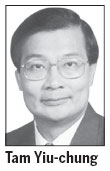Consensus needed in MPF reform
Updated: 2013-02-01 06:56
By Tam Yiu-chung(HK Edition)
|
|||||||||

The Democratic Alliance for the Betterment and Progress of Hong Kong (DAB) has abstained from voting on a motion demanding a comprehensive review of the Mandatory Provident Funds Scheme (MPF). Some people have criticized the DAB for not supporting such a review. They are wrong. The DAB has always shown concern over the issue and has urged the government to initiate reforms.
I had tabled a bill in the Legislative Council in November 2011 calling for a complete review of the MPF Scheme. It included 12 proposals to reduce management fees, increase investment options for employees and improve ways of regulating the MPF. We believe that reforming the scheme is one of 10 issues the DAB had hoped the Chief Executive would include in his maiden Policy Address.
So, how can anyone say the DAB does not support a review of the MPF? The reason we abstained from voting on the latest motion is that it not only demanded a full review of the scheme, but also sought to implement major policies, which we found too preliminary to proceed in a rush.
The motion had sought to abolish the mechanism allowing participating employers to hedge their share of MPF contributions against long-term service fees and severance pay. The hedging mechanism has been in the Occupational Retirement Scheme for years. If abolished, the business community and small-and-medium size enterprises, in particular, would have to bear another financial burden on top of the minimum wage. The motion also demanded that the government pay the minimum MPF contributions for working individuals who are between jobs - another major and delicate policy issue. The DAB believes changes of this nature should be scrutinized by the Labour Advisory Board and a consensus should be reached to avoid any controversy. The interests of employers and employees must be viewed in the best possible balance before decisions are made on whether to execute major changes. Another amendment demands that a "universal retirement protection scheme" be tied to the MPF reform. That is a highly significant policy that must be carefully discussed to the last detail and then brought under public consultation, until a consensus can be reached on whether to go forward or not.
The DAB maintains that MPF reform should be backed by public consensus and focused on resolving the most critical issues. There is no doubt the biggest flaws in the scheme are low returns and high management fees. According to figures from the MPF Schemes Authority (MPFSA), the annualized IRR since the scheme was established is a mere 3.4 percent. In fact, many MPF accounts have remained in the red. Meanwhile, an advisory report released by the MPFSA shows that management fees have eaten up 1.75 percent of total MPF contributions, of which 0.75 percentage point, or HK$2.7 billion, has been taken up by administrative charges.
Employees' hard-earned money has been nibbled away by fund managers at the expense of retirement protection. That is why we believe the government must focus on fixing the low return and high management fee problem when it launches an MPF reform. For this reason, one of the key objectives should be pursued under MPF system reform should be a ceiling on service fees. That maximum fee should be adjustable according to risk levels of investment vehicles. The government should also study the feasibility of appointing a public institution as an MPF trustee.
Another request of ours is that an investment product be pegged to the returns of the Foreign Exchange Fund, one linked to the inflation rate. We also propose a bank savings-type investment exempt from management fees should be added to the MPF investment options. "Too few options to choose from" is another major problem in the MPF system. Currently, there is no way for risk-averse or soon-to-retire MPF contributors to put their money in banks without management fees. The government should cater to such demands by requiring MPF trustees to provide fee-free bank savings-style investment options. Singapore's Central Provident Fund has been established for over 50 years and still under government coordination with 5 percent investment return guaranteed by the authorities. We hope the SAR government will study the feasibility of following Singapore's example in putting the Monetary Authority in charge of investment management so as to keep handling fees at the minimum and offer a certain degree of assurance on investment return. We believe members of society should have a say in this regard.
For the sake of increasing market competition and effectively reducing management fees, we urge the government to implement the policy that allows contributing employees to switch trustees whenever they see fit and improve the transparency of the management fee structure by requiring trustees to give investors a detailed report on all the fees and investment handling cost every year.
We trust the MPF system will regain public confidence if the system reform is focused on fixing the above-said key issues and providing better protection for people's investments.
The author is a Hong Kong member of the Chinese People's Political Consultative Conference and a Legislative Councilor.
(HK Edition 02/01/2013 page1)